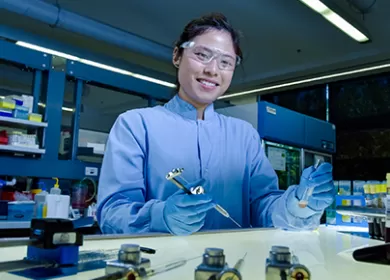Lifeblood partners with RMIT for blood donation research and innovation
Australian Red Cross Lifeblood has welcomed a strategic innovation partnership with world leading university RMIT.
The three-year collaboration aims to benefit the health and wellbeing of Australians and provide a blueprint for improved ways of working for the not-for-profit organisation.
Planning is underway for the first round of projects. Priorities of the partnership include co-developing innovative solutions to enhance Lifeblood’s capabilities and service offerings, emerging technology development, preventative health opportunities and expanding Lifeblood’s donor panel.
Under this partnership, Lifeblood’s Innovation team will have access to RMIT’s equipment, laboratories, and creator spaces, along with the expertise of its staff and student talent, while RMIT will benefit from internships for students and working with an industry partner on projects with the potential to save lives.
Lifeblood Director of Innovation and Product Development Andrew Scott said he is excited about the possibilities of the partnership with RMIT, which allows great minds to come together to think big and learn fast.
“Someone somewhere in Australia relies on blood or blood products every 18 seconds,” Mr Scott said.
“The demand for blood and blood products is at its highest level in a decade and will continue to increase as our population grows and ages.
“We must continue to adapt and evolve what we do and how we do it to meet that demand and implement our findings to advance healthcare.”
The open innovation partnership will include RMIT’S STEM (Science, Technology, Engineering and Mathematics) College, College of Design and Social Context and College of Business and Law, capturing a broad range of expertise.
Professor Catherine Itsiopoulos, RMIT’s Executive Dean, School of Health and Biomedical Sciences said RMIT is proud to be a strategic university partner of Australian Red Cross Lifeblood and will bring the depth and breadth of its world-class researchers in health and biomedicine, design, engineering, business and system logistics to drive Lifeblood’s Unlocked Strategy 2027.
“Cross-disciplinary research will support Lifeblood's open innovation ambitions for life-changing outcomes. Through our vocational and higher education programs we’re also preparing our students for careers in the industry and connecting them to Lifeblood’s important work,” Professor Itsiopoulos said.
Lifeblood and RMIT have previously worked on projects together including improved cryopreservation protocols for long term storage of platelets, improving the blood supply chain and preserving donor human milk.




